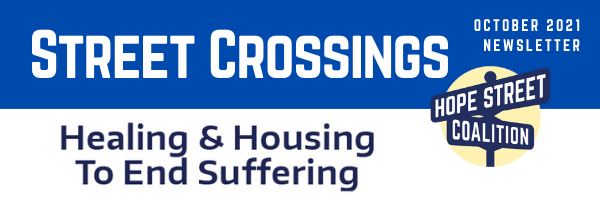By Paul Webster
(Note: Paul Webster, MPP, is the former HUD Senior Policy Advisor. He now runs his own organization, Hope Street Coalition, which addresses homelessness, mental illness, and addiction. – DG)
Dear David,
It’s been an amazing summer and I've been swamped! Hope Street Coalition has been working to change the status quo regarding homelessness, mental illness, and addiction and things are starting to change.
First, Hope Street has created an initiative to advocate for more housing that heals. We are pushing for the creation of residential care communities that provide supportive housing and treatment so that those with mental illness and addiction can stabilize and improve. In a nutshell, we are advocating for cost effective long-term residences that provide clinical outcomes, radical hospitality, and therapeutic communities of dignity and support.
To support this effort, Hope Street is putting together important resources so you can share them with your representatives, supervisors, and commissioners. Cost effective programs that save counties and states money while providing clinical outcomes for their residents exist and we need more of them. Stay tuned as we put the finishing touches on our campaign to incentivize the development of housing that heals.
Also, Hope Street has partnered with the LA Alliance for Human Rights. The Alliance sued the city and county of Los Angeles to end the homelessness crisis in L.A. They are advocating for shelter, treatment, and regulation of public spaces in the city with the highest number of people experiencing unsheltered homelessness.
Having walked the streets of Skid Row and seen the devastation of people and communities first-hand, I can tell you that the LA Alliance is serving as a model for action. Hope Street has partnered with the Alliance to help push for the critical role adequate housing and treatment plays in helping people and communities.
Hope Street is also working with the City of Chico, California to develop a strategic plan to address homelessness and its impacts. What I am seeing in Chico is similar to what several communities are experiencing – untreated and unhoused mental illness and addiction with nowhere for people to go to get the help they need. In Butte County, not one detox bed exists to help those with substance use disorders!
It’s been an amazing quarter and we couldn’t do it without your help and support. Would you please consider a financial contribution to keep the work going? Your gift will go towards developing and deploying resources to creating housing that heals.
By the way, if you’d like to read my reaction to President Biden’s new plan to solve homelessness, you can read it here.
Thank you for your support and partnership.
Paul Webster
Director
Copyright © 2021 Hope Street Coalition, All rights reserved.
To read more articles, access David Geiger’s blog at www.davidegeiger.com
Read Goodreads reviews of In the Matter of Edwin Potter at www.davidegeiger.com
IMOEP YouTube and other videos at www.davidegeiger.com/videos
IMOEP is available at Amazon, Goodreads, Barnes & Noble, and www.davidegeiger.com
David Geiger is a licensed and retired professional electrical engineer who spent 7 years in psychiatric hospitals and over 40 years since 1979 in the courts as a result of his schizophrenia. He worked for Consolidated Edison in NYC for 20 years and won recognition and an award for his work there. He writes about his illness in the book as well as those who have the illness and are caught up in the criminal legal system.
